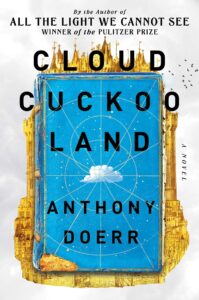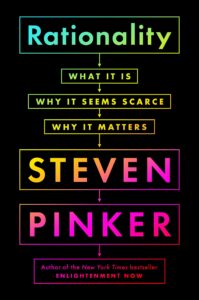
Our fivesome of fabulous reviews this week includes Erin Somers on Jonathan Franzen’s Crossroads, James Wood on Anthony Doerr’s Cloud Cuckoo Land, Jennifer Szalai on Steven Pinker’s Rationality, Heidi Julavits on Karl Ove Knausgaard’s The Morning Star, and Nathan Goldman on Joshua Cohen’s The Netanyahus.
“Sorry to Franzen’s haters, but Crossroads is an excellent novel … Franzen brings to this novel a refreshing simplicity. At times, he has shown himself to be over-enamored with the novel form; he has a tendency to connect all his disparate elements back to the whole, even at the expense of credulity. Novelists should strive for coherence, yes, and get mileage out of their inventions. But his novels, at their weakest, bend too much to coincidence, or worse, demonstrate an excessively orchestrated causality. You can see the seams … Crossroads is the first book of a planned trilogy, and the complete narrative might yet prove too neat. But in volume one anyway, Franzen has left behind such machinations. He has jettisoned, also, his impulse to explain how the world works. Absent are the corrupt systems, polluting corporations, institutions in decay that populate his other novels. What remains is family drama as high art. What remains is Franzen’s gift for interiority, his uncanny ability to take us into minds as fraught and depraved as our own … This is why Franzen is always worth reading. He articulates the terror of exposure. The fear that people will see you for what you actually are. The flimsiness of the facade, the trembling doubt in every heart.”
–Erin Somers on Jonathan Franzen’s Crossroads (The AV Club)

“It’s less a novel than a big therapeutic contraption, moving with sincere deliberation toward millions of eager readers. The author might reply, with some justice, that a fable is a therapeutic contraption, and so is plenty of Dickens. Doerr’s new novel, though, is more of a contraption, and more earnestly therapeutic, than any adult fiction I can recall reading. The obsessive connectivity resembles a kind of novelistic online search, each new link unfolding inescapably from its predecessor, as our author keeps pressing Return … [Doerr] often writes very well, and is excellent at the pop-up scenic evocations required by big novels that move around a lot. Although the arcs of his stories may tend toward a kind of sentimental pedagogy, his sentences, in the main, scrupulously avoid it. He knows how to animate a picture; he knows which details to choose…Yet his prose is regularly on the verge of formula, and too often capitulates to baser needs … Artistically, this sincere moral and political urgency does the novel few favors, as the book veers between its relentless thematic coherence and wild fantasias of storytelling. But that urgency may also account for the novel’s brute didactic power; it is hard to read, without a shudder, the sections about the desperate and deluded Argonauts, committed to voyaging for centuries through space-time because life on earth has failed. A pity, then, and a telling one, that Doerr finally resolves nearly every story optimistically and soothingly.”
–James Wood on Anthony Doerr’s Cloud Cuckoo Land (The New Yorker)

“For someone who so frequently and serenely proclaims that he’s right, Steven Pinker can get curiously defensive … When Pinker is dealing with abstract puzzles involving small-stakes situations, the book is familiar but fine. The trouble arrives when he tries to gussy up his psychologist’s hat with his more elaborate public intellectual’s attire … The tone of Rationality isn’t as relentlessly chipper as that of the previous book, but Pinker’s optimism seems to have weathered the Trump years and the pandemic largely intact. He still disparages those who have the audacity to question his ideas about progress—who argue that enlightened elites invoking the language of ‘reasonableness’ haven’t always benefited humanity. He repeatedly says that by promoting rationality he’s promoting ‘epistemic humility,’ but you’d be hard-pressed to find much humility here, as he pronounces that among the biggest barriers to rationality’s triumph is ‘the universities’ left-wing suffocating monoculture’ … In 2007 Pinker lent his professional expertise to Epstein’s legal defense team, which argued that Epstein hadn’t violated a federal statute prohibiting the use of the internet to lure minors across state lines for sexual abuse. ‘According to Dr. Pinker, that is the sole rational reading in the English language,’ the affidavit stated—a sterling example of a thinking process so confidently pristine that it can give unthinking cover to the grotesque.”
–Jennifer Szalai on Steven Pinker’s Rationality (The New York Times)
“… made me feel as though I were drifting through a nearby galaxy, randomly encountering and re-encountering certain celestial beings, before being released, with a disembodied whoosh, into metaphysical deep space … Knausgaard, when tuning in to life’s minutiae, and the musing that emerges from it, is such an easy writer, not as in not-difficult but as in fluidly engaging … plot points that might define a different novel do not define this one. That neither the star nor the stalking evil seems essential to the reading experience makes the novel even more beguiling. When I started it, I assumed I was meant to find patterns and clues to connect the sections. To solve the structure, and thus identify the King-like mystery, after which there might be a pulse-yammering blood bath or just a deepening degree of more specified creep. Eventually, I shelved those expectations and happily shuttered that part of my brain … Knausgaard’s sentences, in Martin Aitken’s translation, are both plainly direct and lyrically, emotionally elevated. The present is lived to its sometimes transportive, sometimes meaningless fullest … I’m never quite sure whether or not Knausgaard, whose work has taken up so much literal and figurative literary space, is knowingly ironizing himself, his masculinity sulks and his bourgeois/high-art domestic toils. Reading him, I can sometimes feel as if I’m being made privy to—and meant to sympathize with, or find scorchingly candid and thus audacious and original—the internal gripes of the ‘genius’ male artists whom a few women in my extended professional circle have married, and whom these women now care for as if they were also their children … Sometimes more can be revealed about writers when they are not in the overt act of exposing themselves.”
–Heidi Julavits on Karl Ove Knausgaard’s The Morning Star (The New York Times Book Review)
“The homage to the Jewish American canon dictates the novel’s entire form, turning The Netanyahus into a midcentury pastiche—a Jewish campus novel animated by Rothian hijinks and brief bursts of Bellowish lyricism … By staging the conflict between American and Israeli Jewishness on these terms, Cohen implicitly sets himself the task of demonstrating the form’s enduring value. Diasporic fiction, he suggests, can contest the Zionist monopoly on the meaning of Jewishness. The project is admirable for its attempt to reckon earnestly with both the legacy of American Jewish literature and the material meaning of Jewishness today, but it’s also too beholden to fixed archetypes to respond imaginatively to the experience of contemporary Jewish life. Rather than bringing forth a new brightness from a broken tradition, his attempt to render the 20th-century Jewish American novel newly relevant through an ironic repurposing of exhausted tropes only carries us back into that lineage’s most familiar features. The result is a novel that understands itself as live and potent, but is really anemic, even undead … The Netanyahus shows how, even with a glaze of self-consciousness and a thoroughgoing sense of irony, the exploitation of a sapped form can cut off avenues of new thinking, returning us to tired modes.”
–Nathan Goldman on Joshua Cohen’s The Netanyahus (Jewish Currents)

